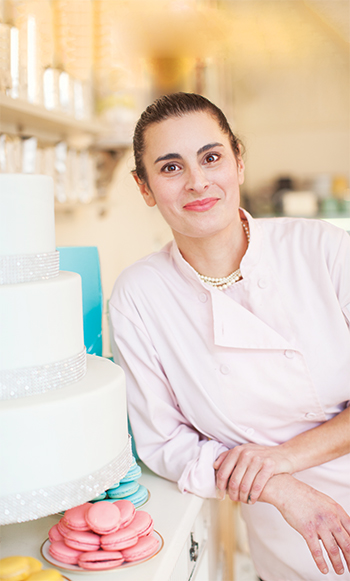Melita Fiore wanted to study fine art. But that’s not what happened. Instead, she wound up a paralegal in a law office where things were, well…stale and, at times, sad. “People do not seek attorneys for joyous occasions,” notes Fiore, who now spends her days in an anything-but-stale and nearly always joyous place— her own pa?tisserie.
When she was 15 years old, Fiore worked in a little bakery called Wheat Berries owned by an Italian couple in Manchester-by-the-Sea. On Sundays, “an old nonna” came in to help. Fiore remembers that everything was made from scratch and, though there was not a great variety, it was all very good. “The whole place was sensorial and made me feel happy to be alive,” she recalls. “It was just a natural environment for me.”
Today, she channels that kind of positive energy into her shop on Washington Street, which she built with the help of her late father. A week after Fiore signed the lease, he was diagnosed with a terminal illness and told he had mere weeks to live. But he survived another year and spent much of that time at his daughter’s side putting up framework, walls, and tiles. There’s heart in her shop, and soul. And that has much to do with the fact that her father’s hand has touched it all. “It’s a wonderful memory to have of him,” reflects Fiore.
With its pastel tones, upcycled finds, and dreamy feel, the shop is meant to be a respite from things “too serious.” The de?cor is partially inspired by films like Sophia Coppola’s Marie Antoinette—the creams and blues of her private salon behind Versailles—as well as other pastry shops including one belonging to a relative in Scaletta. “Older people held court there,” says Fiore. “It was the first place to open and the last place to close; it was where the public telephone was—it was the epicenter, which is something it would be nice to see more of.”
|
In addition to popping in from the street for a little something sweet, people call on Fiore to help them celebrate life’s grand moments. “I’m part of it,” she says, “and it is kind of beautiful.” There have been weddings, and birthdays, and even a few requests for gender-reveal cakes. “It’s exciting to be in on that,” she beams. “People primarily come here for joyous occasions.” Having just passed her first-year anniversary mark, it didn’t take her long to find the kind of kinships she so values.
Alongside the bonds formed over pastry, there’s the element of beauty. “The reason I am a pastry chef and not a chef, and the reason I do wedding cakes and not scratch ravioli, is because there is a beauty to it,” explains Fiore. “I came to it a frustrated artist.” Her goal is to make things both beautiful and flavorful—just what a good wedding cake ought to be. Describing pastry in America, she says, “There are two currents—the scratch, simple rustic stuff, and it’s delicious, and then there’s the beautiful.” Marrying the two is something she says was never lost in Europe. For Fiore, “They are equally important.”
Her reputation for excellence is gaining momentum, and her commissions prove it. In 2010, she composed a six-foot interpretive sugar sculpture based on the opera Carmen for the Boston Ballet’s annual gala. And this past November, she made an edible cake and sugar sculpture titled “Reverie” for Peabody Essex Museum’s “Dream” gala. With great passion she describes spun sugar clouds and pillows incorporating embroidery work, Dupioni silk textures, and sugar flowers—which she makes at an “elfin station” in the basement—all supported by PVC pipes, copper, and phalanges.
Having studied under Delphin Gomes and Stephane Glacier, who is known for his sugar work, as well as in Taipei and Tokyo, where she learned about Asian-style pastries on behalf of an employer who was looking to fuse traditional French and Asian flavor profiles, her training is both classic and a bit far-flung. Today, green tea and cherry blossoms make occasional appearances in her French macaroons.
Daily offerings include her enormously popular almond flour macaroons, scratch morning pastries like classic croissants, pain au saige, and pain au chocolate—“the old faithfuls.” Sometimes she will get playful with fruits and cheeses, and all items in her case are easily paired with dark roast coffees from neighboring Atomic Cafe?. (Other local purveyors include Brooksby and Marini Farms.) She also travels once a week to the Chelsea Market, and a great many specialty ingredients are imported from France. Fiore insists on using Fair Trade Belgian chocolate. “You are not going to find anything hydrogenated here. It’s real food.”
Fiore notes Americans’ extreme relationship with food, especially sweets, which they often approach with a feast-or-famine attitude. For her, quality trumps quantity. “It’s about having a small bit of something very good, regularly,” she explains. “Small treats give you a little bit of joy and happiness. And that’s what we are here for.” melitafiore.com

 Melita Fiore in her Salem patisserie
Melita Fiore in her Salem patisserie